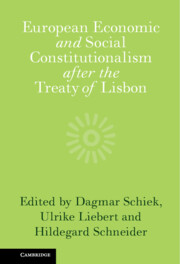Book contents
- Frontmatter
- Contents
- Contributors
- Preface
- Abbreviations
- Table of cases
- Introduction
- Part I European economic and social constitutionalism between norms and practices
- Part II Emanations of tensions between economic and social integration
- Part III Studying cases of possible tensions
- 8 Civic integration of immigrants
- 9 Corporate social responsibility
- 10 Services of general interest provision through the third sector under EU competition law constraints
- Bibliography
- Index
8 - Civic integration of immigrants
A challenge to proportionality and non-discrimination in the common European immigration policy?
from Part III - Studying cases of possible tensions
Published online by Cambridge University Press: 05 July 2011
- Frontmatter
- Contents
- Contributors
- Preface
- Abbreviations
- Table of cases
- Introduction
- Part I European economic and social constitutionalism between norms and practices
- Part II Emanations of tensions between economic and social integration
- Part III Studying cases of possible tensions
- 8 Civic integration of immigrants
- 9 Corporate social responsibility
- 10 Services of general interest provision through the third sector under EU competition law constraints
- Bibliography
- Index
Summary
Introduction
Within the last decade, European migration law has undergone significant changes, starting with the entry into force of the Treaty of Amsterdam in 1999 and cumulating in the 2009 Lisbon Treaty. Title IV of the Amsterdam Treaty for the first time established (shared) Community competence to legislate on migration law. Ten years later, several aspects surrounding the conditions of entry and residence of third-country nationals (TCNs) are regulated at the European Union (EU) level. Yet, for a long time, the extent to which the Union has competence to legislate in the domain of integration of TCNs was a matter of debate between the European Commission and the Member States. The Lisbon Treaty has put a (formal) end to this ongoing discussion by introducing an explicit legal basis for the adoption of legal measures supporting Member States’ integration policies.
- Type
- Chapter
- Information
- Publisher: Cambridge University PressPrint publication year: 2011



